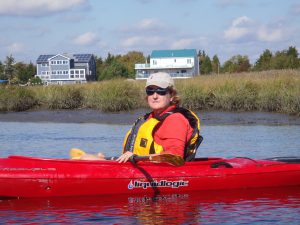Barnegat Bay Partnership’s Martha Maxwell-Doyle Honored for her Inspiration in Coastal Restoration and Management
By Mara Cige

We had the pleasure of interviewing our 2016 Women & Wildlife Inspiration honoree, Martha Maxwell-Doyle, and are pleased to share some excerpts below.
Currently working at the Barnegat Bay Partnership as a project coordinator for estuary protection and restoration, Ms. Maxwell-Doyle’s years of experience at multiple national estuary programs has made it second nature for her to implement conservation and management plans. Her professional and personal partnerships help advance the ability to survey, restore, and monitor coastal communities such as the Barnegat Bay shorelines.
Ms. Maxwell-Doyle has gained a reputation as always being available for guidance and advice, especially for young women new to the environmental and wildlife field. Her enthusiasm for life and the environment drives her to do as much as possible to repair New Jersey’s wildlife habitats while teaching others that a difference can be made. With over three decades of dedication to resource management, hazardous materials, and environmental protection, Martha Maxwell-Doyle has proved to be a powerful force behind habitat restoration and protection.
Join us to honor Martha and the two other 2016 Women & Wildlife Award Winners at Duke Farms on Wednesday, November 30th beginning at 6 pm. Purchase events tickets and find more information.
CWF asked Martha a few questions about what working in wildlife rehabilitation means to her:
What is your favorite thing about your job?
The variety of our work. As one of 28 National Estuary Program focus areas established under the Clean Water Act, we have a comprehensive conservation management plan for Barnegat Bay that looks at all of our natural resources in a holistic ecological manner. That affords us many opportunities on a professional level. Over the last decade I have been able to concentrate my efforts on looking at the impact of climate change on our systems and to develop an estuarine-wide assessment of our coastal wetlands. I love our wetlands for what they do not only for the incredible habitat they provide and the critical role they play for water quality but also how they protect our coastal communities. It’s important that we continue to educate the public about how critical and imperiled these wetlands system are and we can do to be more resilient into the future.
Name one thing you can’t live without.
Cedar water (Pine Barrens rivers). I was born and raised on the Mullica River and no matter where I travel the Mullica will also be home to me. Being on the water brings great peace and happiness for me.
Do you have a New Jersey wildlife species that you like best?
Brook trout. Why? Because they are native and fly-fishing for them (and other species of trout and salmon) take you to amazing places and people. Also dragonflies because they eat greenhead and horseflies out on the marsh!
Name one piece of advice you would give to someone who wants to change the world.
Start local and continue to believe in what you want to do and be. It might take time and some creativity but life is long and each “journey” you take career wise can take you one step closer to your ultimate goal. Be patient and thoughtful.
What do you find most challenging about your profession?
Politics, in that with every election cycle priorities can change – and our natural systems don’t care about political cycles.
What is your favorite thing to do when you aren’t working?
I love doing anything outdoors; fly-fishing, water and snow skiing, bicycling, boating and running/swimming our Labrador Retriever, “Bear”.
Please join us on Wednesday November 30, 2016 from 6:00 – 8:30 p.m. at the Duke Farms’ Coach Barn to honor the contributions that Martha Maxwell-Doyle, Wendy Walsh, and Tanya Sulikowski have made to wildlife in New Jersey.
We are excited to recognize the leadership and inspiration they provide for those working to protect wildlife in New Jersey. Women & Wildlife will also celebrate the timeless and inspiring journeys of wildlife migration in New Jersey and beyond.
Discover more from Conserve Wildlife Foundation of NJ
Subscribe to get the latest posts sent to your email.
Leave a Comment
That is a great inspiration for students to follow with what Martha Maxwell-Doyle has accomplished. I have a curiosity if there is any biological research that can be done to assist Martha Maxwell-Doyle? I am a recent graduate from Richard Stockton college of New Jersey, and I seek work positions for biological research or analysis. Is there any paid or non-paid work available to students that seek work within the biological research field in southern New Jersey? I seek a helpful connection, and appreciate any help given. Thank you.
Comments are closed.